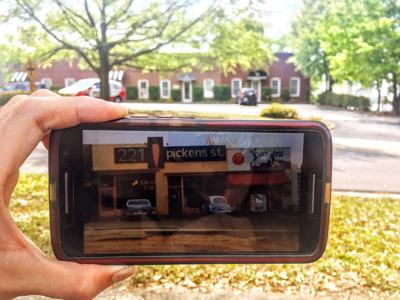
At the site of the original 221 Pickens. The building is now occupied by architectural firm 1x1 Design.
Imagine opening a door to a restaurant and being greeted by the warm smells of fresh bread baking and bright, fresh juice being pressed. While locals fill the cafe to enjoy trays of vegetarian soups and casseroles, cooks in the back are preparing food while others work on projects like growing sprouts and microgreens and preparing soybeans to make tofu. Next door folks are picking up local produce at the food co-op and meeting farmers dropping off their daily goods.
Now imagine it’s 1974.
For a decade, this was the kind of lifestyle that 221 Pickens strove to provide Columbia. Employees and members of the former restaurant and co-op are holding a reunion in Columbia this weekend.
“It was so ahead of its time,” says Mirabai McCleod, who worked at the co-op for three and a half years. She now owns and operates Mountain Mama Catering in Lexington, Virginia. “We recycled, we composted, we did everything organic. We grew sprouts. We had vegetarian food, a raw juice bar, and a food co-op.”
The restaurant was started around 1973 by a group of friends fresh out of high school in Columbia that included chef Frank Lee, best known for his work at Slightly North of Broad restaurant in Charleston, where he emphasized cooking with locally sourced ingredients.
“We had gotten interested in yoga and meditation and were going to meetups where everyone was bringing a covered dish after dancing and meditating,” Lee says. “One of us, Mike Craig, suggested opening a vegetarian restaurant for a month or a year since it was becoming more popular. It all started as sort of a goofy adventure.”
That adventure grew and evolved as people came and went. Lee credits Genie Hardee for bringing in the food co-op aspect a couple of years into the business, particularly putting an emphasis on education. Hardee went on to become a successful teacher of classic Chinese medicine and meditation.
“What was interesting when we opened the natural food store was we did a lot of learning ourselves,” Lee says. “What is miso? Why are whole grains better? Why do we use textured vegetable protein? What is ginger good for? Not only did we educate ourselves, we had to educate the public. It was a never-ending education.“
The dishes at 221 Pickens were always changing as folks learned new dishes and used every opportunity available to try just about anything.
“I remember once taking yellow squash and cut it like lengthwise like a body,” says McCleod. “I would cut a few more pieces to bread and assemble it all to made it look like fried fish. We tried all sorts of things.”
Many of the vegetarian inspirations coming from other countries like India, Japan and Latin American countries. “We were able to learn a lot about other cultures there and try things,” says Lee. “It was real growth.”
221 Pickens wasn’t just about food, but also community. The location served as a hub for social movements and a venue to discuss issues such as food shortage and healthy eating. It was also a place for organizing political ideas and protests. The restaurant was a spawning ground for rallies and conversations on stopping the expansion of nuclear plants in the state, citing concerns over safety and economic stress.
“It felt very much like a place where we were very connected and we felt like we were part of something,” says Nicki Anahata Musick. Musick worked at 221 Pickens for several years, helping bring raw foods preparation to the store and opening what may have been Columbia’s first juice bar. “We were an alternative community. We were encapsulated. We were looking for something new and revolutionary to bring into society.”
The store, while popular, hung on by a shoestring. Prices were only slightly above the base cost of the products. It would take on members, with the requirement being participating in helping the store a couple hours a week.
“So many times our energy was in harmony,” Lee says. “So many times the right people would show up at the right time and interesting things would happen. You’d need something to happen and it would. It was kind of magical in a way, because we didn’t know what the hell we were doing. Our energy drew people to the store.”
221 Pickens closed in the early ’80s. Lee left 221 Pickens prior to its closing to pursue his career in cooking, but cites the changing times as playing a part in the closing of the store.
“We felt we were the hammer and hand of a larger force,” says Lee. “It started in the late ’60s and early ’70s, and as we went into the ’80s that force seemed to dissipate, not just here but around the nation.”
Since the closing of 221 Pickens many of its members have gone on to careers that stemmed from their experiences at the co-op. Many had successful careers in the food industry, including Benoit St. Jacques, who worked at 221 Pickens and went on to lead the kitchen at Rosewood Market.
“I realized recently while thinking about 221 Pickens that every nickel I’ve made supporting myself and my family I learned in South Carolina,” says McCleod. “When I moved to Virginia I became manager of the food co-op when I moved thanks to my experience working at 221 Pickens. I often am making vegetarian dishes for people through my catering company that no doubt have roots back at 221.”







